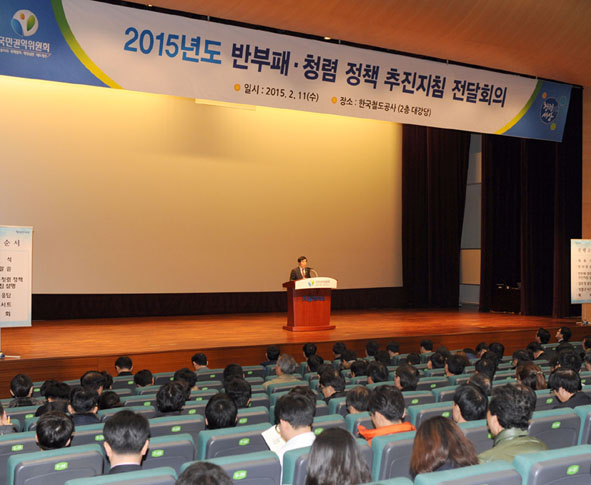News & Publications
Press Release
ACRC distributes Anti-Corruption Policy Guidelines to public organizations
- Date2015-02-11
- Hit2,552
| In 2015, the ACRC will push ahead with various policies to spread a culture of integrity in order to raise the level of integrity in the public sector in line with the people's expectations. It will focus on conducting a campaign to encourage high-ranking officials to take the "Integrity Pledge," making integrity education mandatory for public officials, and creating the Code of Conduct for Ministers. On February 11, 2015, the ACRC held a meeting at the Korea Railway Corporation where the 2015 Anti-Corruption Policy Guidelines were distributed to compliance officers from about 1,300 public organizations, including central government agencies, local governments, municipal or provincial offices of education, and public service-related agencies. |  Chairman Lee Sungbo gave opening remarks at a briefing session on the 2015 Anti-Corruption Policy Guidelines |
| At this meeting, the ACRC explained the anti-corruption policies and their specific guidelines to be prioritized for the year, such as reforming the awareness of civil servants, improving laws and regulations in corruption-prone areas, and strengthening the protection systems for whistleblowers, and requested all levels of public organizations to cooperate actively to implement those policies. The major contents of the ACRC's anti-corruption policy guidelines are as follows: First of all, the ACRC plans to encourage high-ranking officials to take the lead in spreading a culture of integrity throughout the public service sector. To this end, it is planning to create the "Code of Conduct for Ministers," in order to apply stricter behavioral standards to the public officials at the highest level. In addition, the ACRC will revise the Act on Anti-Corruption and the Establishment and Operation of the Anti-Corruption and Civil Rights Commission to obligate all civil servants to complete anti-corruption training. Second, the ACRC will enhance cooperation with the concerned agencies for more accurate analysis and diagnosis of corruption-prone areas, and increase efforts to ensure that the results of the analysis feed into policies. Moreover, to improve the reliability of the Integrity Assessment, it will increase the number of local councils subject to the Integrity Assessment, where the level of corruption is perceived as relatively high, and frequently monitor the occurrence of corruption in public organizations and reflect the status in their respective integrity levels. Third, along with institutional improvements in corruption-prone areas conducted by the ACRC, it will implement the measures to induce all levels of public organizations to make voluntary efforts to improve laws and systems. It will create plans to improve legal and institutional frameworks in areas where corruption consistently occurs due to closed operation of the organization by conducting intensive fact-finding investigation. The Commission will also identify and resolve irrational institutional problems threatening the safety of the people. Furthermore, the ACRC will provide "integrity consulting" service for the organizations with constantly low integrity levels and suggest customized improvement plans, as well as expand support for the organizations that have difficulties in conducting the Corruption Impact Assessment or managing the code of conduct. Forth, the Commission will reinforce the protection and compensation systems for those who report suspected acts of corruption and public interest violations, and promote the reporting of false claims of public funds. In order to create a social atmosphere where anyone can blow the whistle in good faith without fear, the ACRC will request all levels of public organizations to voluntarily draw up their own guidelines to protect whistleblowers. In addition, it will strengthen educational and promotional activities related to the protection of whistleblowers. In the meantime, the ACRC is planning to integrate all the channels to report false claims in the non-welfare areas into the Center for Reporting Public Subsidy Fraud, which started its full operation in January this year. It will also make efforts to enact the bill on the Prevention of False Claims of Public Funds to comprehensively monitor false and fraudulent claims of public funds and recover loss or damages to public finds. ACRC Chairman Lee Sungbo requested all levels of public organizations to devote their efforts to "carrying out anti-corruption policies by eradicating corruption one by one, starting with the smallest practice." | |









